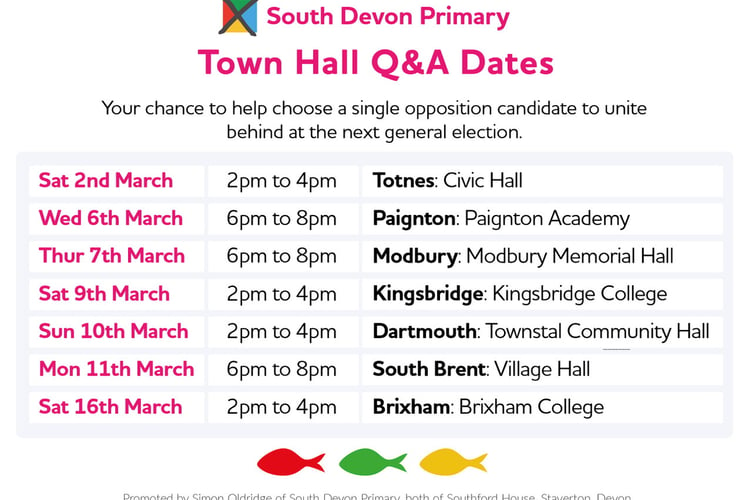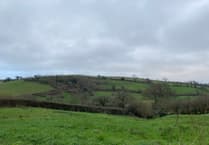It’s not often South Devon creates many headlines politically. The constituency in its various names and slight boundary changes has voted Conservative for the last 100 years. Making it one of the safest Conservative seats in the country. However, this year South Devon Primary are hoping to change that. By providing platforms for progressive candidates to make their pitch to their electorate, be questioned by residents from across the constituency, and then choose who they want to throw their support behind come the general election and try to unseat the Conservatives.
South Hams reporter Aaron Griffin spoke with one of the primary’s founders Simon Oldridge about how the primary will work and why it is needed in South Devon.
Simon opened by speaking about the aims of the South Devon Primary: “To end 100 years of Conservative MPs in this constituency by uniting the votes of the progressive majority, which, because it's split traditionally, has allowed the Conservatives to win on a minority of the vote. And this time, they are predicted to win on just around 30-31%.
“And that doesn't even take into account the significant number of people who don't vote, who don't bother voting, but who are registered. So, at the last election, Anthony Mangnall won on 53%, which sounds like, OK, that's a majority, isn't it? The percentages you get on the BBC and on election night, they're taken of the number of votes cast. If you actually look at the votes as a proportion of total registered voters, to take into account people who didn't vote, then he only won on 39.7%. And the second biggest cohort was 25% of registered voters who didn't bother voting.
“And that's not even including people of voting age who aren't even registered at all. So, it's actually not a Conservative area here, but people think it is because we've had a Conservative MP this whole time. And the way we look at it is we're not surprised lots of people don't vote, because what's the point when you know that it's going to stay Conservative and it has done for 100 years? And that's only happening because of a flaw in the system, a flaw in our voting system.”
Simon then said how each town hall meeting will work: “The candidates will introduce themselves, and then they'll give a five-minute pitch of why we should vote for them.
“And then the floor will be open to questions, like on BBC Question Time, and each candidate will take the questions. And that's a 90-minute process. The first town hall's being chaired by George Monbiot, and we have various chairs for the other one, including Dr Hannah Bunting, who's a political analyst at Sky News.
“And at the end of that 90 minutes, people will be asked to get up and queue up to go and pick up a ballot paper, which they can then fill in with a little screen for privacy, and then they go and put it in a ballot box. The ballot box is going to have two keys. Well, it's a locked metal box, two keys, each candidate.
“You know, we'll give the keys to a set of people, so we can't get into it. And then that goes round from town hall to town hall, until we get to the last one. And then we empty them all out, count them up, and the winner will be declared the People's Champion.”
However, those of you who have been keeping tabs on which parties have declared their candidates for South Devon will know that the Labour Party have not yet declared their candidate for the seat. Simon spoke about how the primary will adapt to this and that the door will always be open Labour to contribute to the process:
“We really want Labour to participate in this. We really hope they're ready, but we have no control over the speed at which they get their candidate in place. We have been talking to Labour since April last year. We met the chair, the then chair, who's changed now.
“He was fully on board with it, really enthusiastic. But, you know, Labour have a big challenge to get all their candidates vetted and ready for the election. And we've seen what can happen if they don't vet their candidates properly.
“And they're in a really difficult position because they're facing a hostile right-wing press that's essentially acting for the Conservative government. So, they get held to much higher standards than the Conservative Party do. So, look, we totally understand that, you know, if they're late, there's nothing we can do about that.
“All we can do is make the process as fair as we can. So we're keeping Labour on the ballot paper. I know there are lots of Labour people signing up because I can see them and I know them. So even from the start, even if the candidate isn't there, they can still vote for Labour.”
After the town hall meetings have been conducted, the votes of the candidates will be counted and a ‘peoples champions’ will be announced, Simon said:
“The vote count is going to be observed by the parties.
“Labour are obviously welcome to join that, even if they don't have a candidate by that stage. But it's going to be observed by the parties.
“In fact, we're live-streaming the town halls, so we'll probably point one of the live-stream cameras at the vote count and everyone can watch it. OK. So it's all about transparency, fairness, trust, and just being totally open.
“So, the BBC National News have contacted us about coming to film the final town hall in Brixham, including the vote count and the announcement of the People's Champion. So that will be great optics. It'll be like election night.
“So, then we'll have a winner. And then what happens is our campaign is in three phases. Phase one is build-up, awareness-building about the town halls.
“Phase two is the town halls itself. Phase three, we then switch into a mode of communicating to the public about the winner. And so all of our volunteers, we ask them not just to vote for the People's Champion, but to go out and help campaign, even if that's not your normal party.
“And that's what people are signing up to do. That's what people are saying they'll do. So, what we expect to recreate here is the kind of buzz that you normally see in by-elections.”

A criticism that could be pointed towards the primary is that whatever decision they come is not binding on the electorate, and residents who don’t like the decision can still vote freely for a different candidate. Simon spoke of the need to compromise during and after the primary:
“I keep going back to the fact that there's so much more that unites us than divides us.
“Particularly since the Conservatives have moved so far right. They've become UKIP almost. You've got this choice.
“We either come together and accept that we're not all going to get 100% of what we want, we're going to compromise a bit, but we get a hell of a lot more than we want if we allow the Conservative candidates to get in again. But in the end, absolutely, we respect people's right to vote for whoever they want. We are not, and this is really important, we're not asking any of the losing candidates to step down off the ballot paper.
“We expect all the candidates to be there. We're not trying to restrict democratic choice. We're trying to give people who typically want to unite behind the candidate with the best chance, but they just don't know which one it is, the choice of doing that.
“And we know that, going back to me knocking on doors, people will say, which is the best one, what's the best choice? Most people are really looking for that. They'll just be hearing different things from different people because each of the parties is saying, oh, we're the best choice because of this. And the parties cancel each other out.
“It often becomes ridiculous, they fight each other more than the Conservatives. So to those very many people, this has really caught their imagination. And we know from speaking to people on the street that people really love this idea.
“We've got on our leaflet, which has been delivered to all the doors in this constituency by Royal Mail. It's got a phone number on the bottom. And I'm getting so many calls through from people saying, I'm so grateful you're doing this, this is really needed.
“And there's people from all parties. And they're saying, look, I am happy to vote for whoever, because this is bigger than these differences. This is about protecting our democracy, which is crumbling.
“And it's about fighting for serious action on the climate and nature crisis, which all of the progressive parties, to varying degrees, are talking about doing. Whilst the Conservatives are acting for Big Oil. So, there's a huge difference there.
“And I think that we're going to find so many more people prepared to put aside those tribal party stripes and get behind the candidate that's ahead.”




